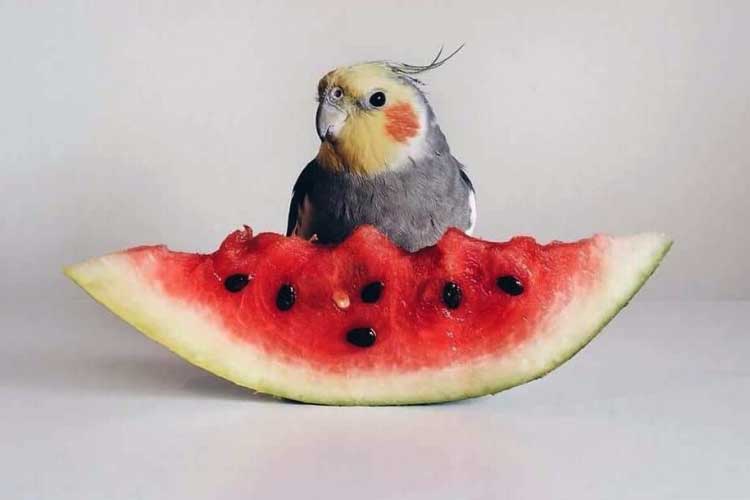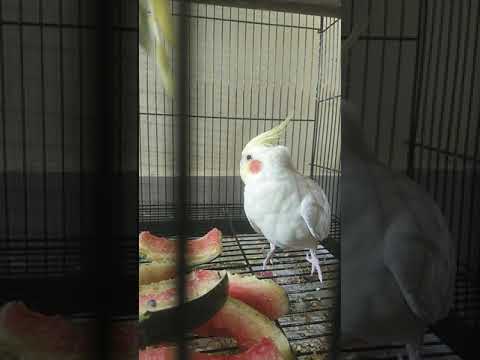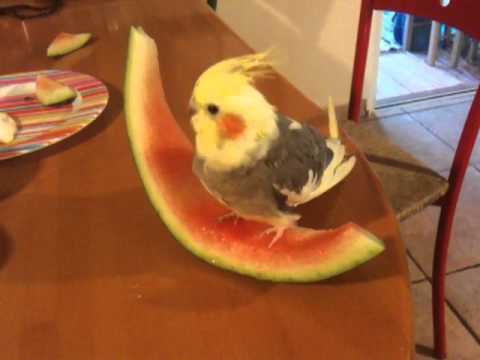You need to have safely consumable fresh fruits in your cockatiel’s diet. Watermelon is one such fruit that’s hydrating and nutritious, and cockatiels love eating them.
Can Cockatiels Eat Watermelon? Yes, they can eat watermelon without any harm. It’s an excellent source of moisture and sugar that can energize your bird rapidly. The vets recommend a tiny bite of fruit every day for the cockatoos. So while altering fruits in the weekly diet, having a small piece of watermelon once a week could be an ideal option.
You’ve to be careful about feeding watermelons to your cockatiels, and they should be organic and free from pesticides. We’ll talk more about the precautions and how to serve them in the best possible way. To continue reading the article.
Can You Feed Watermelon to Cockatiels?
It’s absolutely safe to feed watermelon to your cockatiels. They can easily chow down a slice of watermelon and get hydrated in the hot summer months. Besides being the most hydrating fruit, there are several other health benefits of eating watermelon for cockatiels.
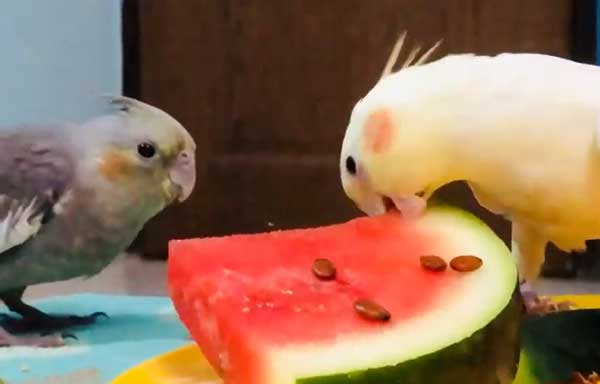
That said, you’ve to be smart enough while feeding this fruit to your cockatiel. Here we’ve got some key facts regarding watermelon and feeding it to your dear bird. Let’s check them out.
Alter Watermelon with Other Fruits
You’ve to be careful about feeding watermelon moderately to your cockatiels. The best way to do that is to alter it with other fruits to ensure your cockatiel gets it once a week or so.
Ensure Hydration & Essential Minerals
Watermelon can turn out to be an incredible food for your cockatiel. Its high amount of moisture helps your bird stay hydrated and active. It’s also low in calories and enriched with many important nutrients for your cockatoo, including Vitamin A & C, Thiamin, Potassium, and Phosphorus.
Feed Moderately
Bird owners often confuse the optimal amount of watermelon to feed their cockatiel. Since it contains around 90% of water, you don’t need too much of them to ensure hydration or nutrition for your bird. Also, it’s a sugary fruit, so a handful of watermelon chunks sparingly should be good enough for your cockatiel.
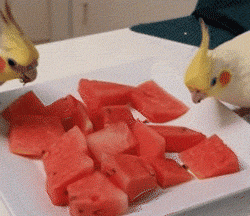
However, you need not worry even if your cockatoo eats them too frequently or too much at once. They will still be harmless and won’t cause serious issues to your darling birds.
Precautions
When feeding watermelon to your favorite cockatiels, remove the watermelon seeds and the rind(the greenish skin) before serving them.
The rind or seeds themselves aren’t toxic or harmful. But rinds can carry pesticides or parasites, and seeds can cause choking hazards. So it’s better to remove them. Also, rinse the watermelon or any other fruit as a basic safety precaution.
Do Cockatiels Like Watermelon?
Cockatiels generally love eating the soft and sweet flesh of watermelons. So most cockatiels have fun eating this fruit. However, some bird owners have different experiences and say their cockatoos don’t like watermelon that much.
Will your cockatiel love it? The answer is most likely yes. Try to find a sweet and juicy slice to serve them. You can also mix them with other fruits like grapes, papaya, mango, etc., to ensure they enjoy it.
Health Benefits For Cockatiels Eating Watermelon
Watermelons are beneficial to the health of cockatiels in many ways. Let’s take a look at some of the key benefits here:
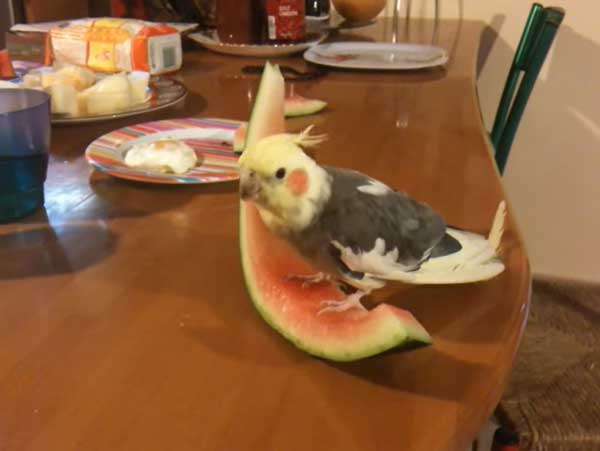
Keeps Hydrated
The water and sugar content in the watermelon helps keep your bird hydrated, strong, and active during the hot summer. Watermelon also contains potassium and balances the electrolytes for your cockatiel’s body. A perfect hydration and electrolyte balance move important nutrients into the cells to keep your bird healthier.
Essential Vitamins
Watermelon contains essential vitamins including Vitamin A, B5, and C. While vitamin A helps the cockatiels grow and maintain healthy feathers, Vitamin B5 benefits their digestive tract and eyes. The Vitamin C in the watermelon boosts the immunity of your cockatiel and helps him fight better with diseases.
Other Important Minerals
Watermelons are also enriched with other important minerals like copper, fiber, carbs, and fat. They help your cockatiels maintain a healthy heart, bones, and nervous system. Its fibers also ensure healthy digestion for your cockatoo.
How Much of Watermelon Should Cockatiels Eat?
An average slice or a few handful pieces of watermelon per week is an ideal amount for your cockatiel to eat. Don’t be tempted to feed them more because of your cockatiel’s liking or the watermelon’s nutrition value.
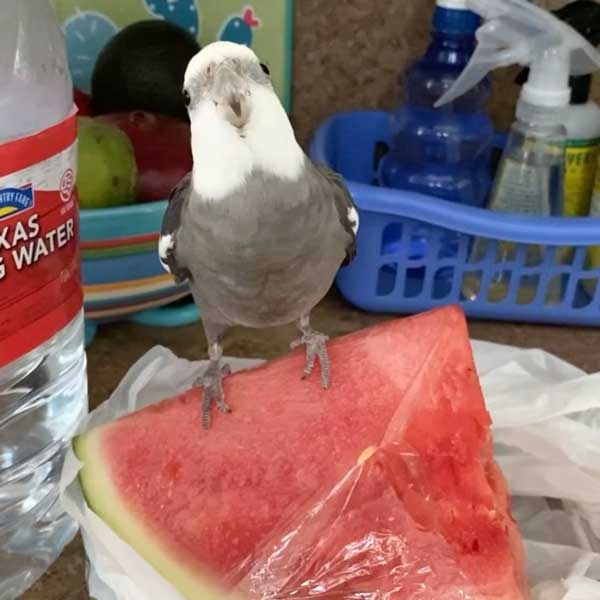
Since it’s a sugary fruit and contains excessive water, feeding too much of them could deprive your bird of getting the right nutrition from other important vegetables and fruits.
How Do You Prepare Watermelon for Cockatiels?
Try finding natural and organic watermelons. When you’re ready to serve, wash the watermelon thoroughly to remove the dirt and any sort of pesticide (in case used).
Cut and remove the rind, which is outside the shell of the watermelon. These are generally safe for cockatoos, but they might contain parasites that can cause illness to your bird.
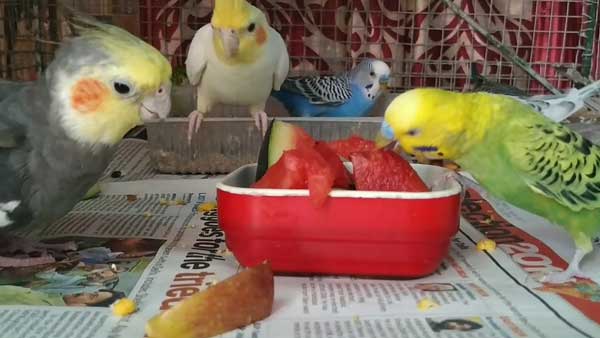
Cut an average slice of the watermelon into a few smaller chunks so your cockatoo can easily chow them down. Although cockatiels can eat seeded watermelon, removing them is better to avoid choking issues.
Can You Feed Watermelon to Baby Cockatiels? If So, How?
Yes, it’s absolutely fine to feed watermelon to the nestling cockatiels. They might even enjoy it if offered properly. Make sure you buy an organic one, wash it properly, remove seeds & rind, and cut out the juicy flesh into smaller bite-size pieces. A couple of pieces should be enough per week.
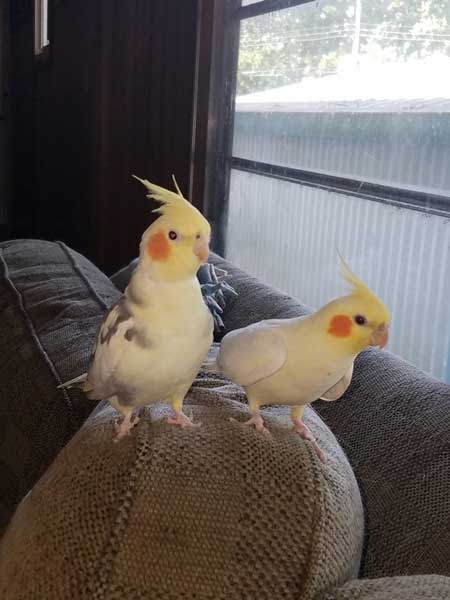
Video Of a Cockatiel Eating Watermelon
Check out how an adorable cockatiel is enjoying eating watermelon.
FAQs
Let’s get some FAQs answered here.
Vets say that fruits, veggies, and greens should make up at least 20% (but not more than 25%) of your cockatiel’s diet. You can customize the portion of fruits accordingly.
The watermelon rinds aren’t really nutritious like its juicy fleshes. Besides, they can contain pesticides and fungicides, which can cause illness to the cockatiels.
Final Words
When considering balanced diets for your pet cockatiel, you should look for safe, nutrient-dense fruits. The watermelon comes on the top tier, especially for its high water content that can ensure hydration, electrolyte, and energy for your cockatiel. Watermelon is a sugary fruit, and the cockatiels usually enjoy eating them without any problem.
It contains many essential vitamins such as Vitamin A, B5, and C, potassium, copper, and fiber. Although they’re beneficial to the birds, you should offer them in moderation. Also, ensure they’re washed thoroughly, and their seeds and rind are removed for a safer eating experience for your cockatoo.
Do you know if your cockatiels can eat tomatoes or parsley? Read our articles about it to learn more.
